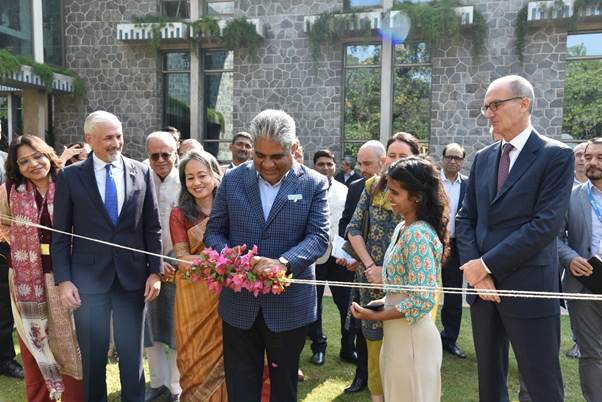New Delhi : The Union Minister of Environment Forest and Climate Change Bhupender Yadav addressed the special United Nations Country Team (UNCT) on the key themes and takeaways from CoP 27 at UN House, today. The meeting was followed by the inauguration of the Climate Change Photo Exhibition with the Swiss Embassy at the UN House in New Delhi.

Shri Bhupender Yadav at the Special meeting of UNTC

Shri Bhupender Yadav inaugurating the Climate Change Photo Exhibition

Mr Shombi Sharp, United Nations Resident Coordinator in India, congratulated the Government of India on its vitally important contributions made at the recently concluded CoP 27 at Sharm el-Sheikh, Egypt. He remarked that India’s bold leadership on the climate agenda, and the innovative solutions increasingly emerging from government and private sector partners in India, are a beacon to the world for a more sustainable, just and equitable global future.
In his address to the special UNCT meeting, Shri Bhupender Yadav said:
“Ladies and Gentlemen,
I am happy to be amongst you all in this special meeting with UN Country team which focuses on key takeaways and outcomes from recently concluded COP 27. I have just returned from COP27 and I am sure you would have followed its proceedings and read its outcomes.
It was an implementation COP with a headline outcome on funding arrangements including a dedicated loss and damage fund. Today, I would like to hear your views on your approach to operationalize the COP27 outcomes in India, in keeping with our National Development Priorities.
At COP26 in Glasgow, Prime Minister Shri Narendra Modi shared his vision of LiFE – Lifestyles for Environment as a key approach to promoting sustainability and combating climate change. Since then, much work has been done to translate this vision into a plan of action. Mission LiFE was conceptualized to take forward this message to the global community.
The UNSG has reinforced the importance of Mission LiFE, by participating in its launch event on 20th October at Kevadia, with PM Shri Narendra Modi. I am glad to share that the cover decision of COP-27, called Sharm el-Sheikh implementation plan, notes the importance of transition to sustainable lifestyles and sustainable patterns of consumption and production for efforts to combat climate change. India seeks to involve a billion people in this global mass movement of Mission LiFE. We made a start, with several LiFE related events at the India Pavilion during COP27. I appreciate the involvement of UNEP and UNDP in these events.
One immediate task ahead is to create a LiFE compendium of global best practices on sustainable lifestyles. This will be a comprehensive repository containing best practices from around the world. I understand that UN INDIA is already working with NITI Aayog and MoEFCC in this regard. There could be many other ways to roll out the COP27 decision on transition to sustainable lifestyles. For example, UN India could consider organising a global conference on Mission LiFE during India’s G20 Presidency.
Many UN agencies are implementing agencies under GEF and some are also accredited entities under GCF. We are now preparing a shelf of projects for the GEF 8 cycle. I expect that outcomes of COP27 on sustainable lifestyles, climate action in agriculture, mitigation work program and just transition would be factored in appropriately, in the upcoming projects.
COP27 has established a 4-year work program on climate action in agriculture and food security. Agriculture, the mainstay of livelihoods of millions of smallholder farmers, will be hard hit from climate change. We look at the agriculture sector primarily as a sector for adaptation and building climate resilience. We should not burden our smallholder farmers and pastoralists with mitigation responsibilities.
FAO, in particular, may note that India has kept mitigation in agriculture out of its NDCs. COP27 has also established a work program on just transition. For most developing countries, just transition cannot be equated with decarbonisation, but with low-carbon development.
Developing countries retain the right to choose their energy mix and in achieving the SDGs. Just transition is not just an issue for individual countries, it is also about a global just transition. Developed countries taking the lead in climate action is therefore a very important aspect of the global just transition.
At COP27, there was an agreement to set up a loss and damage fund as part of wider funding arrangements for addressing, averting and minimizing loss and damage. The contours of this fund, including its contributors and beneficiaries, would be worked out later in the course of the coming year. India is voluntarily providing support as part of wider south-south cooperation. India bears no responsibility for the climate crisis, but stands in solidarity with the global south on loss and damage issues.
UN agencies anchor many environment conventions and treaties. I would insist that the UN system remains steadfast in the protection of foundational principles of each of these conventions and treaties in its work in different countries.
For India, the principles of equity and CBDR-RC in the light of national circumstances remains, paramount. I urge you to ensure that these foundational principles are respected when you prepare projects for implementation in India.
Red-tapism is the bane of all bureaucracies and I am afraid it does not spare the UN system either. Many reporting requirements under the multilateral environment conventions and treaties are funded through GEF projects.
I am given to understand that three critical projects on fulfilling reporting requirements under the UNFCCC and Paris Agreement have not yet taken off, even one year after its approval by GEF. Such delays are strictly avoidable. The concerned UN agency may kindly take note, and I request that these projects may definitely be launched in the coming month.
With these thoughts, I thank you for organising this interaction and I look forward to hearing your views.”

Comments are closed.